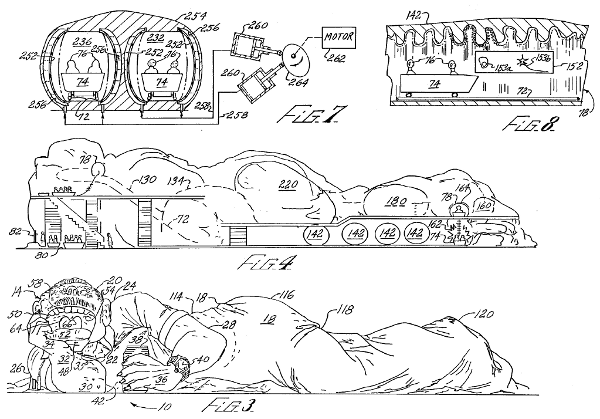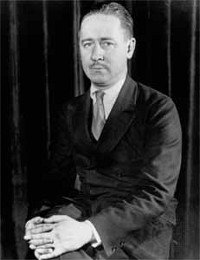viaticum
n. money or necessities for a journey
Author: Greg Ross
Opposites Exact

Prove that, at any given moment, there are two points on the equator that are diametrically opposed yet have the same temperature.
Anatomy Lesson

In 1988, Shao-Chun Chu conceived a unique way to teach people about the human body — an amusement ride that would carry passengers through an enormous model of a sleeping man and woman:
An educational amusement apparatus forms a large building structure having an external appearance simulating a man and a woman resting partially under a blanket, wherein riders are taken through a succession of cavities that simulate internal organs of the man and woman. Entrance to a head chamber simulating an oral cavity is achieved by a stairway supported by a simulated arm of the man, the oral cavity having displays of teeth in normal and abnormal conditions, and serving as a staging area for a train to carry the riders. The train passes into a simulated cranial cavity of the woman, past a sectional display of simulated ear organs, and into a body portion of the building that is representative of the abdomen of both the man and the woman, first through a simulated esophagus, stomach, and intestine of an alimentary canal, through simulated urinary and reproductive tracts, then through a simulated liver and a simulated cardiovascular canal, and finally through a simulated lung and windpipe to an exit staging area of the building.
Chu hoped the ride would encourage people to take better care of their bodies and would be “effective in transporting a large ridership.” His 10-page patent abstract contains sentences that I’m pretty sure have never been written before (“Further, the structure continues to descend until the cars become partially submerged in the lake of the stomach, preferably with considerable splashing”). Unfortunately, to my knowledge it’s never been realized.
“Advice Concerning Low Spirits”
A letter from Sydney Smith to Lady Georgiana Morpeth, Feb. 16, 1820:
Dear Lady Georgiana,– Nobody has suffered more from low spirits than I have done — so I feel for you. 1st. Live as well as you dare. 2nd. Go into the shower-bath with a small quantity of water at a temperature low enough to give you a slight sensation of cold, 75° or 80°. 3rd. Amusing books. 4th. Short views of human life — not further than dinner or tea. 5th. Be as busy as you can. 6th. See as much as you can of those friends who respect and like you. 7th. And of those acquaintances who amuse you. 8th. Make no secret of low spirits to your friends, but talk of them freely — they are always worse for dignified concealment. 9th. Attend to the effects tea and coffee produce upon you. 10th. Compare your lot with that of other people. 11th. Don’t expect too much from human life — a sorry business at the best. 12th. Avoid poetry, dramatic representations (except comedy), music, serious novels, melancholy, sentimental people, and everything likely to excite feeling or emotion, not ending in active benevolence. 13th. Do good, and endeavour to please everybody of every degree. 14th. Be as much as you can in the open air without fatigue. 15th. Make the room where you commonly sit, gay and pleasant. 16th. Struggle by little and little against idleness. 17th. Don’t be too severe upon yourself, or underrate yourself, but do yourself justice. 18th. Keep good blazing fires. 19th. Be firm and constant in the exercise of rational religion. 20th. Believe me, dear Lady Georgiana,
Very truly yours,
Sydney Smith
Forewarned

In 1900, while a senior in high school, Harry Truman was struck by this passage in Tennyson’s “Locksley Hall”:
For I dipt into the future, far as human eye could see,
Saw the Vision of the world, and all the wonder that would be;
Saw the heavens fill with commerce, argosies of magic sails,
Pilots of the purple twilight dropping down with costly bales;
Heard the heavens fill with shouting, and there rain’d a ghastly dew
From the nations’ airy navies grappling in the central blue;
Far along the world-wide whisper of the south-wind rushing warm,
With the standards of the peoples plunging thro’ the thunder-storm;
Till the war-drum throbb’d no longer, and the battle-flags were furl’d
In the Parliament of man, the Federation of the world.
There the common sense of most shall hold a fretful realm in awe,
And the kindly earth shall slumber, lapt in universal law.
It describes an aerial war of the future. Tennyson had written it in 1835, long before the advent of modern aircraft, but it assumed an eerie significance in 1940, when Germany undertook a sustained assault on the United Kingdom.
“This is a complete prophecy, if not virtually a description, of the Battle of Britain,” wrote Sir Douglas Bader, who commanded a Royal Air Force squadron during the fighting. “‘… the heavens fill with shouting’ refers to radio-telephonic communications between pilots. It is significant when one reads such prophecies (not related to the New Testament) after the event and finds them so accurate.” Winston Churchill called the poem “the most wonderful of modern prophecies.”
Truman, who by then was a senator from Missouri, had not forgotten it either: After discovering the poem in that high school class, he had copied out the passage and carried it ever since in his wallet.
Changing Subjects
When a man dies
His portraits change.
His eyes look at you
Differently and his lips smile
A different smile. I noticed this
Returning from a poet’s funeral.
Since then I have seen it verified
Often and my theory is true.
— Anna Akhmatova, 1940
Better Safe

One bright day in Hollywood, a friend discovered Robert Benchley sitting in his room under a sunlamp.
When the friend asked why he didn’t go outside to get his sun, Benchley said, “And get hit by a meteor?”
Nonsense Cookery
Edward Lear’s recipe for Gosky Patties, 1872:
Take a pig three or four years of age, and tie him by the off hind-leg to a post. Place 5 pounds of currants, 3 of sugar, 2 pecks of peas, 18 roast chestnuts, a candle, and 6 bushels of turnips, within his reach: if he eats these, constantly provide him with more.
Then procure some cream, some slices of Cheshire cheese, 4 quires of foolscap paper, and a packet of black pins. Work the whole into a paste, and spread it out to dry on a sheet of clean brown waterproof linen.
When the paste is perfectly dry, but not before, proceed to beat the pig violently with the handle of a large broom. If he squeals, beat him again.
Visit the paste and beat the pig alternately for some days, and ascertain if, at the end of that period, the whole is about to turn into Gosky Patties.
If it does not then, it never will; and in that case the pig may be let loose, and the whole process may be considered as finished.
Number Forms

When thinking of numbers, about 5 percent of the population see them arranged on a sort of mental map. The shape varies from person to person, assuming “all sorts of angles, bends, curves, and zigzags,” in the words of Francis Galton, who described them first in The Visions of Sane Persons (1881). Usually the forms are two-dimensional, but occasionally they twist through space or bear color.
People who have forms report that they remain unchanged throughout life, but having one is such a peculiarly personal experience that “it would seem that a person having even a complicated form might live and die without knowing it, or at least without once fixing his attention upon it or speaking of it to his nearest friends,” wrote philosopher G.T.W. Patrick in 1893. One man told mathematician Underwood Dudley that “when he told his wife about his number form, she looked at him oddly, as if he were unusual, when he thought that she was the peculiar one because she did not have one.”
The phenomenon is poorly understood even today; possibly it arises because of a cross-activation between the parts of the brain that recognize spatial relationships and numbers. Two of Dudley’s students were identical twins; both had forms, but the forms were different. “Although our understanding of how the brain works has advanced since 1880, it probably has not advanced enough to deal with number forms,” he writes. “Another hundred years or so may be needed.”
Flip Day
January 10, 2011, is a palindrome in four different notations: 1/10/2011, 1/10/11, I/X/MMXI, and I/X/XI.
